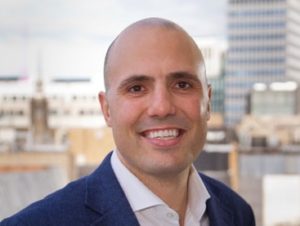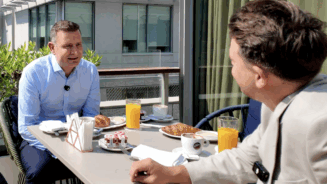International Adviser’s sister brand Investment International threw the spotlight on Joe Jackson (pictured above), director – financial adviser at Spiritus Wealth to find out more about his ‘DIYMoney’ initiative in this new Adviser Spotlight Q&A.
What is DIYMoney?
We know there’s a huge ‘advice gap’ in the UK – Royal London suggest there are 30m people who need financial advice but who can’t afford it. Since RDR, Advisers have focused on higher-net-worth clients who can afford to pay their fees, and the absolute number of practicing advisers has shrunk, leaving huge swathes of the population with no professional help to rely on.
So what’s the solution? We hear words like ‘targeted support’ and ‘simplified advice’ at the moment due to the FCA’s Advice/Guidance Boundary review, and it seems as though we might be getting close to a workable, viable solution, at least from a compliance perspective. But we’ve seen the evidence that it is commercially impossible to operate a profitable business serving customers without the means to pay meaningful fees. Ask Vanguard why they launched and then exited the UK advice market so quickly.
Having been a Financial Adviser now for the best part of 15 years, and still in my mid-to-late 30s, I’ve realised something potentially quite profound. Financial Planning need not be complicated, certainly for those who are building up their assets over their working life (the accumulation phase in industry parlance). Everyone has access to a fairly priced, functional workplace savings offering. Let’s teach people how to use them properly.
People from their mid-20s to their early 50s really need to be doing 4 very similar things… and doing them consistently. The first: Budgeting effectively to make space for monthly savings; Second: having a carefully constructed financial safety net in place; Third: saving for Financial Independence; and Fourth: putting something aside for medium-term expenses (what we call Buying Choice). We think that if those people can do those four things they don’t need to see a financial adviser. Problem solved.
That’s where DIYMoney comes in.
DIYMoney is a service which enables employers to support the financial wellness of their employees. Money is confusing and complicated, and finding qualified advice is extremely difficult (and can be prohibitively expensive). More to the point, studies have shown that as many as 2/3rds of UK workers don’t want to talk to anyone about money. It’s the last remaining taboo.
The DIYMoney Hub is a library of online content designed to take employees from where they are right now (financial amateurs), all the way along the path to financial competence. We show people how to design, build and maintain their own financial plan, without having to fork out thousands of pounds for individual advice. The team behind DIYMoney are qualified and regulated financial advisers, and our mission is to share our knowledge and experience with those who need it most, at a fraction of the cost.
Unlike other Financial Wellness offerings in the marketplace, we offer access to the DIYMoney Hub using the Trivial Benefits rules, meaning there is no P11D impact, no requirement for employees to opt-in, no changes to company payroll system or Salary Sacrifice. It’s one low-cost fee for access, and the content is applicable to everyone.
In short, we give people a ‘Financial Planner’s Kaleidoscope’, to see the world as we do… with all the tips and tricks and shortcuts people need to make sound financial choices for themselves and their families.
Why did you want to launch it?
I’m 37 in June, and if I had a tenner for every time one of my mates asked me a simple question about Financial Planning, I think I’d have about £850. From “I’ve just moved job, should I move my pension to my new one”, to “I’ve just had a second child, do you think I have enough Life Cover?”.
I think they ask me these questions because I’m their mate. If they weren’t mates with a Financial Planner, I don’t think they’d ask anyone. That’s an issue.
That’s why we’ve built DIYMoney as a workplace benefit. It lets people have access to all the knowledge they need, but without having to ask for it. We’ve split the content up into sections so people can find what they need fast. We’ve designed the content to teach people to help themselves.
And the benefit to the employer is significant as well. For a relatively low annual cost, they can make real inroads into the ubiquitous challenge of improving their employees’ relationship with money. If they can improve that relationship, it’ll pay dividends everywhere else in their lives, including at work.
We want DIYMoney to perform a genuine societal good. People need access to the knowledge of Financial Planners, even if they can’t afford it.
DIYMoney benefit to other businesses
There are so many studies out there about the positive impact of improving Financial Wellness in the workforce. Three massive stats we’ve found: 7/10 employees say financial stress impacts their work (regardless of seniority), the cost to the UK economy of financial worries in the workforce is a staggering £120bn per annum, and poor financial health (presenteeism, absenteeism and retention issues) cost employers between 13 and 17% of payroll costs each year.
An employer who puts measures in place to deal with Financial Wellbeing is going to be paid back in spades.
Spiritus Wealth
I and Richard Martin-Redman, director – financial adviser (pictured below) started Spiritus Wealth in 2014 at the ripe old ages of 26 and 32, and we’ve built a great business looking after relatively wealthy families, predominantly in the South-East of England. We’re not huge, we look after approximately £120m of asset across approximately 90 client families between us.

We realised a couple of years ago that if we walked through our metaphorical door as prospective clients, we’d be of no professional interest to ourselves. Not much asset built up, big mortgages, young kids, and simple needs. We also realised if we downloaded a couple of hours worth of our brains we could help thousands of people just like us, and it wouldn’t need to cost very much at all. That’s where the idea came from, and we’re now engaged in trialling the content with businesses who are interested in taking up the challenge.





